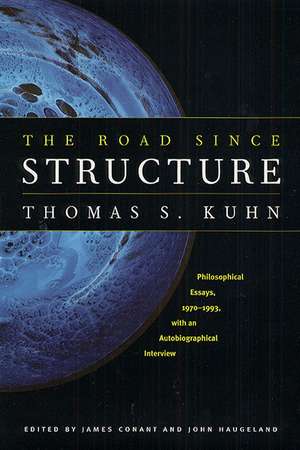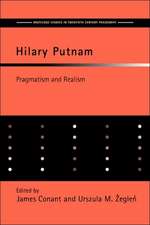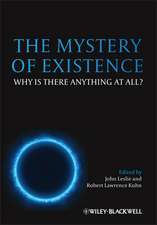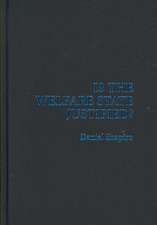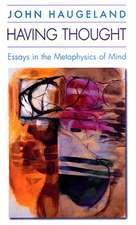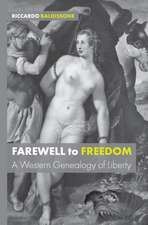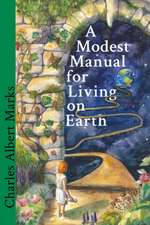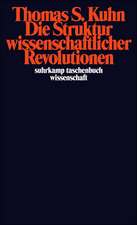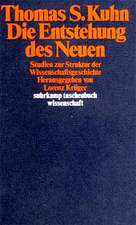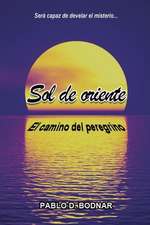The Road since Structure: Philosophical Essays, 1970-1993, with an Autobiographical Interview
Autor Thomas S. Kuhn Editat de James Conant, John Haugelanden Limba Engleză Paperback – 31 oct 2002
Thomas Kuhn will undoubtedly be remembered primarily for The Structure of Scientific Revolutions, a book that introduced one of the most influential conceptions of scientific progress to emerge during the twentieth century. The Road Since Structure, assembled with Kuhn's input before his death in 1996, follows the development of his thought through the later years of his life: collected here are several essays extending and rethinking the perspectives of Structure as well as an extensive, fascinating autobiographical interview in which Kuhn discusses the course of his life and philosophy.
Preț: 257.99 lei
Nou
Puncte Express: 387
Preț estimativ în valută:
49.37€ • 51.68$ • 40.85£
49.37€ • 51.68$ • 40.85£
Carte tipărită la comandă
Livrare economică 05-19 aprilie
Preluare comenzi: 021 569.72.76
Specificații
ISBN-13: 9780226457994
ISBN-10: 0226457990
Pagini: 336
Ilustrații: 6 halftones
Dimensiuni: 152 x 229 x 33 mm
Greutate: 0.46 kg
Ediția:1
Editura: University of Chicago Press
Colecția University of Chicago Press
ISBN-10: 0226457990
Pagini: 336
Ilustrații: 6 halftones
Dimensiuni: 152 x 229 x 33 mm
Greutate: 0.46 kg
Ediția:1
Editura: University of Chicago Press
Colecția University of Chicago Press
Notă biografică
James Conant is a professor of philosophy at the University of Chicago. He is the editor of two books, Hilary Putnam: Realism with a Human Face and Hilary Putnam: Words and Life.
John Haugeland is also a professor of philosophy at the University of Chicago. He is the author of two books, Artificial Intelligence, the Very Idea and Having Thought: Essays in the Metaphysics of Mind, and the editor of two books, Mind Design and Mind Design II.
John Haugeland is also a professor of philosophy at the University of Chicago. He is the author of two books, Artificial Intelligence, the Very Idea and Having Thought: Essays in the Metaphysics of Mind, and the editor of two books, Mind Design and Mind Design II.
Cuprins
Foreword Jehane R. Kuhn
Editors' Introduction
PART 1: RECONCEIVING SCIENTIFIC REVOLUTIONS
1. What Are Scientific Revolutions?
2. Commensurability, Comparability, Communicability
3. Possible Worlds in History of Science
4. The Road since Structure
5. The Trouble with the Historical Philosophy of Science
PART 2: COMMENTS AND REPLIES
6. Reflections on My Critics
7. Theory Change as Structure Change: Comments on the Sneed Formalism
8. Metaphor in Science
9. Rationality and Theory Choice
10. The Natural and Human Sciences
11. Afterwords
PART 3: A DISCUSSION WITH THOMAS S. KUHN
Publications of Thomas S. Kuhn
Editors' Introduction
PART 1: RECONCEIVING SCIENTIFIC REVOLUTIONS
1. What Are Scientific Revolutions?
2. Commensurability, Comparability, Communicability
3. Possible Worlds in History of Science
4. The Road since Structure
5. The Trouble with the Historical Philosophy of Science
PART 2: COMMENTS AND REPLIES
6. Reflections on My Critics
7. Theory Change as Structure Change: Comments on the Sneed Formalism
8. Metaphor in Science
9. Rationality and Theory Choice
10. The Natural and Human Sciences
11. Afterwords
PART 3: A DISCUSSION WITH THOMAS S. KUHN
Publications of Thomas S. Kuhn
Recenzii
"It's sometimes claimed that Kuhn toned down his radical views after Structure, but this is a mistake. He did occasionally repudiate earlier ideas, but the bulk of his later work is a significant articulation and defense of his fundamental views, not a retraction. . . . The Road Since Structure ends with a fascinating 68-page interview with Kuhn, recorded a year before his death. This gives a strong sense of his personality and of the development of his ideas and career. It brings out the extent to which the history of science was for him from the start a vehicle for philosophical inquiry."
"In 1962, Thomas Kuhn wrote The Structure of Scientific Revolutions, arguing that science proceeds in two ways. 'Normal' science does experiments and expands our knowledge under agreed theories; but 'revolutionary' science introduces a new conceptual framework (a 'paradigm shift'), and demands that we abandon some of what was previously believed. . . . This very useful collection shows the evolution of Kuhn's ideas from 1970, with replies to his critics (including Popper and Feyerabend), and a long interview conducted a year before his death in 1996."
"Thomas Kuhn wrote The Structure of Scientific Revolutions in 1962 for a long-forgotten series of monographs called the International Encyclopedia of Unified Science, which is ironic, in retrospect, because Kuhn's masterpiece did not really unify science at all. It broke it open, exposing the inner workings of human creativity and starting, along the way, a thousand arguments."
"The essays fall into three groups, each arranged chronologically. The first shows the development of Kuhn's thought from 1980 through 1990, the second consists of his responses to criticisms of other philosophers, the last is a candid, highly interesting and informative interview Kuhn did a year before his death. . . . His work is central to the question of the relation of science and culture."
